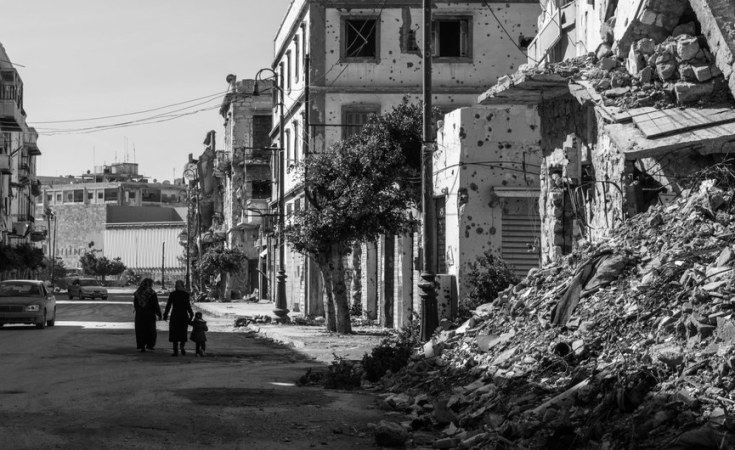Washington — Across the United States and many other Western countries, the threat from Islamist terror groups has been increasingly overshadowed by the threats from other extremist groups, some of whom have proven to be more deadly in recent years.
But despite a rise in far-right and white-supremacist-driven terrorist threats, counterterrorism officials have been careful not to overlook the still persistent threat from groups such as the Islamic State and al-Qaida.
"Jihadism is, yes, it is the main threat right now still in the Netherlands," Netherlands Justice and Security Minister Dilan Yeşilgöz-Zegerius said in response to a question from VOA during a visit to Washington in late November.
"Now you see the threat. You see still the ideology," she said. "But the firm organization and the level of organization, also in Europe and in our country, that's breaking down."
Targeting IS and al-Qaida leadership
One reason for the breakdown - both the Islamic State, known as IS, ISIS or Daesh, and al-Qaida suffered significant setbacks in 2022.
"It was certainly a year of decapitations," Edmund Fitton-Brown, a former senior United Nations counterterrorism official, told VOA.
Despite concerns about a possible IS resurgence, the United States dealt the terror group a "significant blow" when its leader, Abu Ibrahim al-Hashimi al-Qurashi, blew himself up following a nighttime raid by U.S. special forces.
Less than eight months later, IS was hit again, losing Abu Ibrahim's replacement, Abu al-Hassan, after a raid by rebels with the Free Syrian Army.
In between, a series of operations by the U.S., partners such as the Syrian Democratic Forces, and allies such as Turkey, kept the pressure up, contributing to the death or capture of at least 10 key IS leaders in 2022.
Already, the U.S. appears to be cracking Islamic State's defenses, with officials telling VOA they have information on the group's new leader, known only by the nom-de-guerre, Abu al-Hussein al-Husseini al-Qurashi.
Should the U.S. be able to track him down, the impact could reverberate across the jihadi world.
"That starts to look like they have a real problem," Fitton-Brown, the former counterterrorism official, told VOA.
"It's as if the thread of wool (is) just being pulled and pulled and the sweater is coming to pieces, and they can't seem to stop it," he said. "At what point does this actually sort of weaken the brand to the point where ... it's where people, that people cease to actually want to identify with it because it starts to stink of failure?"
Setback for Al-Qaida
Al-Qaida also was dealt a considerable setback in August, when a U.S. drone strike killed its leader, Ayman al-Zawahiri in his residential compound in Kabul, Afghanistan.
"Justice has been delivered," U.S. President Joe Biden said, announcing al-Zawahiri's death to the world. "No matter how long it takes, no matter where you hide, if you are a threat to our people, the United States will find you and take you out."
Since then, al-Qaida leadership has been somewhat quiet, its succession plans strained, with al-Zawahiri's likely successor stuck in Iran.
And Western fears about the terror threat emanating from Afghanistan have yet to materialize, with top U.S. counterterrorism officials saying that the IS affiliate there, IS-Khorasan, like al-Qaida, has been sufficiently weakened that it cannot make good on its desire to launch attacks against the West.
Instead, the nexus of the jihadi terror threat continues to shift elsewhere.
Countering terror threat from Africa
U.S. Director of National Intelligence Avril Haines told a forum in California earlier this month that the al-Qaida affiliate in Yemen, known as al-Qaida in the Arabian Peninsula, (AQAP) remains the most dangerous and the most capable of attacking the West.
Not far behind is al-Qaida's Somali affiliate known as al-Shabab, which has been financially supporting al-Qaida's core leadership, and which has long harbored a desire to strike at U.S. and Western targets in Africa and beyond.
"The number one I would say probably that we're most concerned about is the threat of al-Shabab in East Africa," Deputy Assistant Secretary of Defense for African Affairs Chidi Blyden told VOA during a virtual briefing this month with the Defense Writers Group in Washington.
"We have partnered with the Somalis to ensure that we are trying to degrade their capability to hurt the partners in the region, as well as their intent or capability to be able to have attacks outside of their current location," Blyden said.
To help counter al-Shabab, the U.S. earlier this year decided it was necessary to keep a "small, persistent presence" of about 500 U.S. troops in Somalia - a move welcomed by the new Somali government.
But other terror groups, including al-Qaida and IS affiliates the Sahel have also made gains.
"There's a conglomeration of violent extremist organizations that are in the Sahel that are also of concern to us," Blyden said. "Their impact on populations in the Sahel and surrounding coastal West African countries is something that we are working with our partners to try and understand more."
The past year also saw some countries, such as France, begin pulling some of their counterterrorism forces out of the region.
Some experts fear, as a result, more problems are likely.
"The probability that an al-Qaida group conducts an international terrorist attack continues to rise as the regional branches strengthen and counterterrorism pressure lifts," Katherine Zimmerman, a fellow at the American Enterprise Institute, told VOA via email.
"Even with the intelligence capabilities the U.S. has--and they are many--the risk that such an attack slips through is slightly higher because of shifts in counterterrorism resources as the global terrorism threat has changed," she said. "It seems as the U.S. footprint shrinks in counterterrorism theaters, so too, does the visibility."


